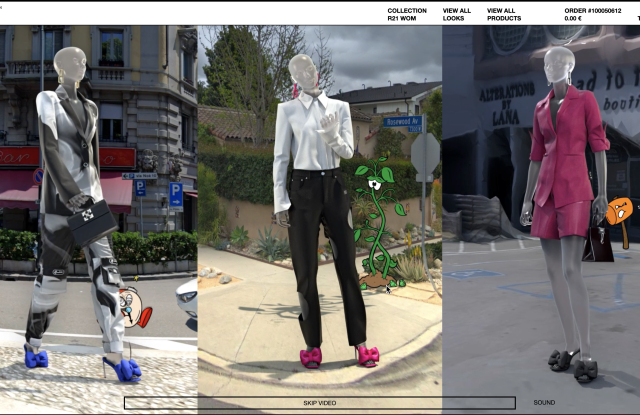MILAN — “Technology’s potential is infinite,” believes Cristiano Fagnani, chief marketing officer of New Guards Group.
A year after Farfetch’s acquisition of the Milan-based platform group, the expected synergies between technology and creativity have taken shape and one example is the striking, immersive experience of the virtual showroom created in just 16 weeks.
“It’s a concert of contributions — Farfetch’s technological infrastructure and innovation with the creativity of our designers,” said Fagnani.
New Guards Group’s is the licensee of Off-White, and its list of brands includes Palm Angels, Ambush, Alanui, Opening Ceremony, Heron Preston, Marcelo Burlon County of Milan, Kirin Peggy Gou and Ben Taverniti Unravel Project.
Fagnani explained that 613 fashion items were digitized without ever producing physical samples, achieved when Italy was in full lockdown beginning March 9.
Four digital wholesale platforms were set up; 279 2-D items were added on a 3-D model to create more immersive imagery and 170 shoes were digitized from videos, but beyond the details, Fagnani emphasized how “going forward, it is evident that [business-to-business] and [business-to-consumer], on- and offline, e-commerce versus physical are technical distinctions in a single ecosystem with the consumer at the center, in an increasingly more holistic and more efficient way.” Digital platforms will be more and more “organic, steps of the same journey with practical mechanisms and more accessible for consumers.”
According to Fagnani, “the first great synergy” with Farfetch “is aligning with direct-to-consumer, the ability to increase our presence and strength on the brands’ direct channels starting with the dot-com platform, giving us a competitive advantage.”
Aligning with the go-to-market calendar launches will be crucial for the release of capsules, for example, with a faster reaction and response.
The coronavirus pandemic accelerated this transformation within New Guards Group, although Fagnani noted that, “clearly, as a partner of Farfetch, the switch to and development of digital was very important from the start.” He remarked on the “change in mentality, opening up to new tools, embracing also the idea of designing in a digital way to present products to buyers in a quick and functional way.” He praised Farfetch for a “dynamic and risk-taking mentality,” as well as its digitally experienced team.

A screenshot of the Heron Preston virtual showroom. courtesy image
Giorgio Belloli, chief commercial and sustainability officer at Farfetch, observed that strategically, the New Guards Group acquisition stems from the idea of “supporting their platform with our expertise, innovation team and technical approach to offers services to the industry,” pointing to years of relationships with start-ups.
“Farfetch has been looking at innovations in this area for 18 months — prior to COVID-19, which meant we could work fast for New Guards Group,” Belloli said. “This presents an opportunity for brands to enhance not only the digital experience, which is necessary now, but also to add an extra layer for inspiration, experience and engagement to physical experiences as well.”
Asked if the decision to digitize the products without actually manufacturing them was in sync with today’s efforts to be more sustainable, Fagnani said while one consideration was to be “more efficient and effective” and to be ready for the season, producing only what was necessary to avoid waste.
The designers were involved in every aspect, “it was a new project for them, too, and they put all their trust in it. They all reacted with great commitment. There was a lot of curiosity on how to pair digital flexibility with craft, to balance technology and quality.” Fagnani said Virgil Abloh was “very excited to use technology, to connect a creative product with a creative experience.”
While moving toward direct-to-consumer, the wholesale channel “remains part of the DNA of the companies, in parallel,” he added.
Belloli explained Farfetch is not only a marketplace, but also a developer of services and web sites, citing the partnerships with Chanel and Harrods as examples. “Farfetch as a business model started with boutiques, creating platforms for independent boutiques, when they could not do so alone, and it has evolved, but the independent boutiques for Farfetch are at the heart of our future, along with new forms of customer engagement.”
The first sales campaign through the digital showroom has shown New Guards Group that it will allow “to be active 12 months a year, it’s very stimulating, opening up to different scenarios and different projects,” enthused Fagnani. “The next step could be the digital show.”

